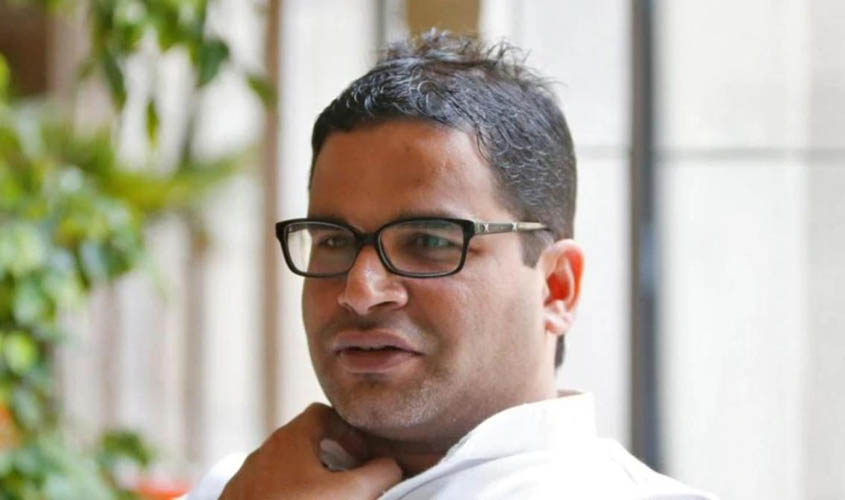Gandhis decide to outsource GOP’s management; admit inability of putting the house in order.
Prashant Kishor is the flavour of the moment in the 137-year-old Indian National Congress. Popularly referred to as PK, since 2014 he has been in the news as a successful poll strategist. He made his debut with Narendra Modi (who did not require his services thereafter). He and his organisation I-PAC (Indian Political Action Committee, which employs some 40,000 young researchers) has been sought by politicians across the spectrum—Bihar’s Nitish Kumar, Amarinder Singh in Punjab’s 2017 poll, DMK’s Stalin, Telangana’s KCR, Andhra Pradesh’s Jagan Reddy, West Bengal’s Trinamool supremo Mamata Banerjee, et al. He had powwows with the veteran Sharad Pawar and even hosted a conclave of sorts at the NCP chief’s New Delhi residence in a bid to hammer together an anti-Modi front in 2021. Since his last success, West Bengal, he went on a year’s sabbatical, which ends on 2 May. Past weekend he was the guest of honour at Sonia Gandhi’s 10 Janpath—Congress bigwigs were summoned to listen to his panacea for reviving the party. 10 Janpath is known for its back-door entrance—the main gate on Janpath is used only by the three Gandhis for access and ingress—the door in the back lane adjacent to AICC office is used by the hoipoloi. PK was driven in from the front gate while the rest of the attendees accessed the back door. Ab initio the importance of PK in the Gandhis scheme of things was affirmed. The meeting lasted over four hours and a presentation was made on how Congress could try to uproot Modi in 2024. The forthcoming state polls in Himachal, Gujarat, Rajasthan, Chhattisgarh—where Congress faces BJP sans regional parties was not on the agenda, though in his interactions with the Gandhis PK is understood to have offered his observations on these polls as well.
Speculation is now on if PK will formally join the GOP or will he merely be the consultant who will revamp somewhat on the lines of the internationally renowned McKinsey & Co, which advises corporations on strategic management. From Sharad Pawar, Mamata Banerjee to Sitaram Yechury, many anti-BJP leaders with whom Sonia Gandhi has sought to do business in recent years have asked the Congress to “put its house in order”. By approaching PK, the Gandhis, without admitting failure, are perhaps trying to bow to Pawar, Mamata, Yechury criticism.
McKinsey &Co were hired by leading media houses—Hindustan Times, Anandabazar Patrika—in recent years and their refurbish plan saw the exit of many leading media persons, who hitherto had prominent national bylines, from the payroll of these newspapers. Will PK’s overhaul agenda see prominent faces of the GOP sidelined likewise? PK is said to have pointed to the Gandhis that Congress presence at the polling booth level is abysmal and its leadership is not cadre-centric, unlike BJP and all regional parties which have held on to their respective turfs in the face of the Modi-Amit Shah electoral juggernaut. If PK’s panacea is accepted wholly, then many heads may roll—and these heads would mostly be of present Gandhi family factotums. For example, after every successive poll debacle Congress has been saying that it could not communicate its message to the people. Since 2015, Randeep Surjewala has been the head of the party’s communications department largely due to his proximity to Rahul Gandhi—if accountability be a criterion, could this be plausible? Thus, if PK’s induction be Congress’ McKinsey moment, the status quo will have to undergo a paradigm change. Gandhis have been in talks with PK since August last year. Sonia Gandhi had entrusted a three-member committee comprising Ambika Soni, Mallikarjun Kharge and A.K. Antony to examine the proposal. It is said that the panel found that an overwhelming number of party persons were not averse to PK playing a role.
With talk of PK’s induction, the guns of the G23 (now 21 after two desertions) seem to have fallen silent. Mukul Wasnik was the same G21 signatory who was present at the 16 April 10 Janpath confabulation. In 2017, Congress had hired I-PAC for the UP elections. It did not yield any result. PK’s formula of projecting Sheila Dikshit as CM face and putting Raj Babbar as PCC chief could not revive the party in the state where it had been headquartered during the freedom struggle (Allahabad’s Swaraj Bhavan, a Motilal Nehru property, was the AICC headquarter from the 1920s till 1947). Acting on PK’s advice, Raj Babbar had got cut-outs of Ghulam Nabi Azad removed in Lucknow. Most district presidents of Trinamool and some prominent leaders were sidelined by PK in the run-up to the 2021 West Bengal elections. Given this background a section of GOP leadership are apprehensive, but are not vocal.
PK has advised Congress to concentrate on 370 seats in 2024 and enter into alliances and adjustments with regional parties. (In 1971, Congress had not contested all seats—certain seats were left in adjustment to CPI, which had helped Indira Gandhi survive the 1969 split by supporting her government from outside, along with DMK.) PK seems to be suggesting a politics of adjustments and not alliance in order to put up a challenge to the NDA in 2024.
In 2014, when Narendra Modi took the nation by storm and created a new paradigm in politics which Congress now seeks to challenge by inducting PK, an Amir Khan starrer science-fiction comedy film directed by Rajkumar Hirani, titled, “pk” had stormed the box office. In that film, an alien from outer space, (Amir Khan) acquires the name “pk” and questions superstitions and dogmas, while the remote which linked him to his extra-terrestrial mooring was misplaced. Will PK (Prashant Kishor), an alien to Indian National Congress till so far, be able to question and change the credendum of the GOP?

